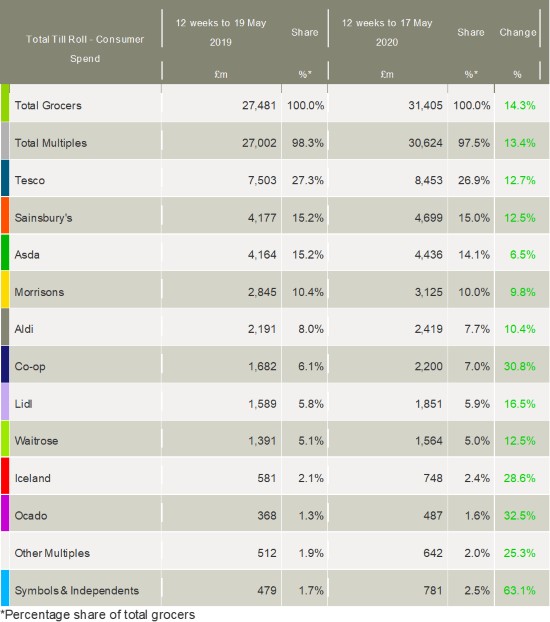Latest supermarket share data from Kantar shows that sales growth in the sector has accelerated in recent weeks as lockdown measures were eased. All the main chains benefitted with Tesco, Lidl, the Co-op, Iceland and Ocado some of the strongest performers. Meanwhile, trends such as shopping more online and in convenience stores continued, while people are still doing bigger weekly shops.
Take-home grocery sales rose by 14.3% during the 12 weeks to 17 May, the fastest rate since Kantar’s comparable records began in 1994. In the last four weeks of this period, sales growth increased to 17.2% year-on-year, having slowed to 5.5% the previous month.
Fraser McKevitt, head of retail and consumer insight at Kantar, commented: “The most recent three-month period now includes both the pre-lockdown rush to the shops in March, and eight weeks of stay-at-home advice from government – a combination which has resulted in the fastest growth in take-home grocery sales for over 25 years.
“While these are bumper figures, it remains true that the overall picture for some grocers will be less positive, as supermarkets continue to feel the impact of a considerable reduction in on-the-go spend on meals, drinks and snacks. Those categories usually add up to £1bn over the course of 12 weeks and they aren’t included in these numbers.”
Over the last four period, Kantar highlighted that the trend towards fewer, larger shops seen in April had broadly continued. Shoppers visited the supermarket 3.5 times per week on average, meaning 100 million fewer trips overall than the same month last year, and increased their spend each trip to £27.41 – nearly 50% more than they did during normal times.
“People have been working their way through their store cupboards over the past couple of months and some will now be spending a bit more on each visit to the supermarket to replenish supplies,” said McKevitt. The greatest rise in spending has been among families catering for more people eating at home rather than at school or work.
Some of this spend has been directed online. Kantar’s data shows that shopping online now accounts for 11.5% of all grocery sales, gaining more ground and attracting more new shoppers in 2020 than the channel has in the previous five years.
“The retailers have done a brilliant job of reacting to a sudden spike in demand by increasing their online capacity, and it’s meant that nearly one in five British households ordered groceries online in the most recent four weeks, 1.6 million more than this time last year,” said McKevitt.
“While the gains made by online shopping are unlikely to be sustained at these levels, the crisis has certainly accelerated the move towards online. The grocers have attracted a new group of customers, in particular older demographics, and we expect some of them may continue using online services and enjoying the convenience that home delivery provides.”
Meanwhile, with consumers taking their first tentative steps out of the full lockdown, the number of people visiting bricks & mortar shops began to increase slightly in the week leading up to 17 May. Shoppers appeared to be making the most of the warm weather to enjoy picnics, with sales of dips up by 22%, crisps by 28% and carbonated soft drinks by 25% during the four week period.
Thursday 7 May, the day before the Friday Bank Holiday to mark 75 years since VE Day, was the biggest shopping day of the month with £488m spent on take-home groceries.
All ten of major grocery chains and the combined group of independent retailers increased sales over the 12-week period. However, Kantar stressed that some of these gains will have been offset by a decline in ‘on-the-go’ purchasing, including breakfasts, lunches and snacks as well as any sales to businesses or schools.
Ocado saw sales rise by 32.5%, with its market share increasing to a new high of 1.6%, up from 1.3% last year.
Shoppers staying closer to home and avoiding queues at large supermarkets benefited both the Co-op, up by 30.8%, and independent retailers, up by 63.1%. The Co-op reached 7% market share, a level last achieved in 2011, while the 2.5% of sales taken by independent grocers was last seen in 2009.
Iceland climbed to a 2.4% share of the market, a proportion of sales it last held in 2000, as its sales increased by 28.6%.
Meanwhile, Tesco led the Big Four with its sales rising by 12.7%. Sales at Sainsbury’s rose 12.5%, while Asda was up by 6.5% and Morrisons grew 9.8%. Lidl, Aldi and Waitrose saw sales rise by 16.5%, 10.4% and 12.5% respectively.
Looking ahead, McKevitt said: “Shoppers and retailers are now thinking about what the impact of a less restrictive lockdown will be, and a phased re-opening of non-essential retail and the out-of-home food and drink sector will have a significant impact on grocery sales in the coming months. However, with plans for reopening the hospitality sector still uncertain, we are currently projecting that extra meals, snacks and drinks consumed at home will mean take-home sales at the grocers could be up 12% over the course of 2020 as a whole.”





